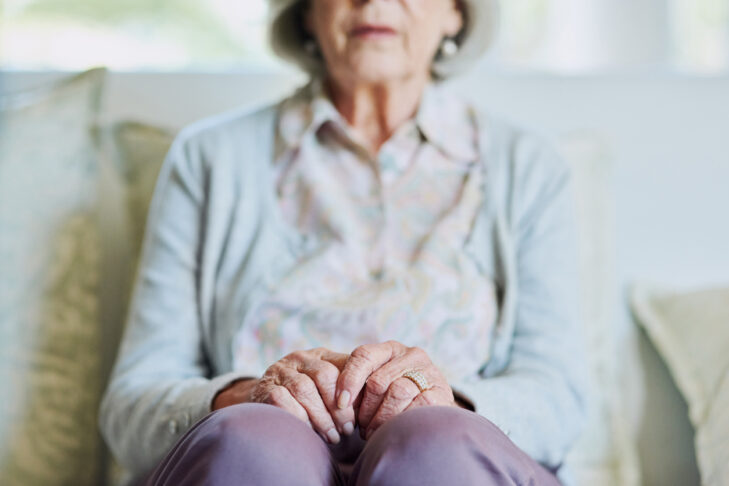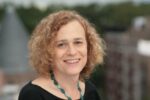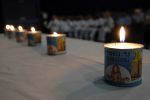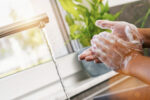My 85-year-old mother, Matilde Bolton, is a patient at Hebrew SeniorLife in Roslindale.
Now that you know that, you’ll understand why this New York Times headline haunts me every moment of every day: “‘They’re Death Pits’: Virus Claims at Least 7,000 Lives in U.S. Nursing Homes.” In the two months since the first coronavirus deaths were noted in a Seattle facility, a fifth of all COVID-19 deaths have been connected to nursing homes. And now, my mother has tested positive for the virus.
I see my mother twice a week via 30-minute calls. So far, she’s asymptomatic for the virus, but she is very confused. Why hasn’t she seen me in “years,” she’ll ask me? The squares that her children and their families populate on the iPad screen disorient her. Where are we? Who is speaking? It’s both comforting and agitating for her to see our pixelated images floating from who-knows-where.
Before I continue, I need to applaud the HSL staff. Each time we Zoom with my mother, a staff person, in full coronavirus attire, is by my mother’s side. (“We metaphorically, and physically, ‘suit up’ and battle COVID-19 for 24 hours a day,” said a recent HSL dispatch to families.) Margo, who is a physical therapist but now deployed to help coronavirus patients, guides my mother during the call. “This is your daughter, Judy,” she patiently points out. “Your granddaughter, Anna, is speaking to you.” My mother nods. Later on the telephone, my mother will ask me to remind her of my sister’s name. “Carol,” I answer, tearing up. “So many people in our family,” she says, bewildered.
Before the coronavirus, my sister and I each visited my mother a couple of times a week. During our visits, I kibitzed and reminisced with her. I amused her when I brought up family lore from decades ago as if it happened yesterday. I got my mother to talk about the big family holiday dinners as if they just happened. “We all fit in Abuela’s small apartment,” she said wistfully. She was clearly delighted.
My sister, a middle school teacher, engaged our mom with simple jigsaw puzzles and general knowledge flashcards meant to test fourth and fifth graders. She skipped the ones with math, but was persistent about questions like, “On which continent is Egypt?” My mother can’t remember what a continent is. It turns out that’s a tricky question. The answer is Africa and Asia.
Carol and I both loved S, my mother’s 100-year-old roommate. “I’m a pistol,” S said about herself the first time I met her, and indeed she was. S was also a fashion plate. She always sweetly commented on what I was wearing with the caveat, “You look good for your age.” I’m reluctantly using the past tense about her. The other day on the telephone, my mother sounded scared as she told me that S coughed and coughed for days and then suddenly, she wasn’t in the room anymore. I don’t dare mention to my mother that the coronavirus is at HSL. I don’t dare tell my mother that she tested positive.
The other day I was talking to a writer about losing her mother to Alzheimer’s disease. She told me that the brain of an Alzheimer’s patient could weigh as much as 30% less than a healthy brain. Over time, the tissue grows porous. In effect, the brain becomes a sieve through which the past slips. What if my mother has the early symptoms of Alzheimer’s? What if we lose our shared history—our newfound camaraderie? My mother and I were never the best of friends. She was a fierce woman, a difficult woman. But things are different now. She is mostly docile, almost sweet. When flashes of her contrarian side show up, I’m oddly relieved. “Yes, there she is,” I think.
And so what can I do for my mother in these days of the pandemic? My JewishBoston colleagues, including our parenting writer Kara Baskin, were part of a live webinar last week “on the unique ways people in our community are helping older family members and friends during the coronavirus pandemic.” Karen Wasserman, founding director of Your Elder Experts, a program of Jewish Family & Children’s Service, joined Kara in conversation. (You can listen here.)
One of my takeaways from the conversation was how we need to connect consistently with our elders during this time of separation. As Kara pointed out, with more independent grandparents, that can mean something as simple as having kids wave to them as they drive by the grandkids’ house. For example, Kara’s young boys rode their bicycles around their grandparents’ parked car as they sat in it and waved. For the elderly like my mother, who has to self-isolate in her small room, Karen suggested recording family stories she can play on a loop so she feels less lonely.
On a recent podcast produced by HSL, Lynda Bussgang, director of the Adam and Matan Adelson Multigenerational Program, shared that she has begun an initiative to collect notes, cards, pictures and letters from students across the Greater Boston area to distribute to seniors in HSL communities. Lynda invites children to send artwork and messages to her at 5000 Great Meadow Road, Dedham, MA 02026.
I’ll be waving again at my mother from my Zoom square this week. I expect her to point at me as she always does to confirm that I am Judy. Yes, I am Judy, Matilde’s daughter. We are family.












